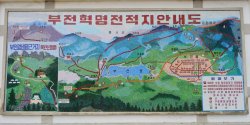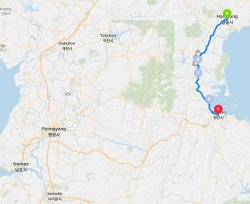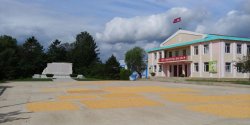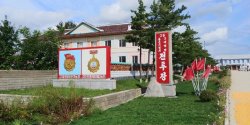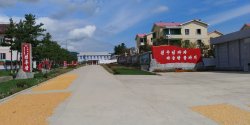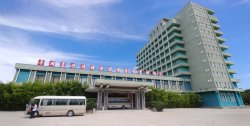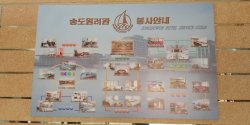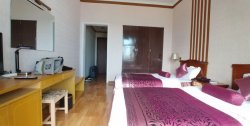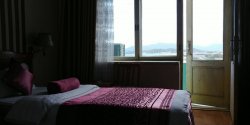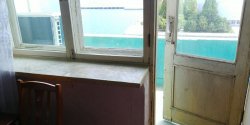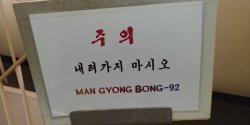You are using an out of date browser. It may not display this or other websites correctly.
You should upgrade or use an alternative browser.
You should upgrade or use an alternative browser.
Democratic People's Republic of Korea / DPRK / Korea (north) - road trip
- Thread starter Chicken
- Start date
- Status
- Not open for further replies.



The above are all out door, protected with fabric and stuffs. I forgot what the messages say?

This little hunt was where the Korean fighters were hiding, waiting for the Japanese. You could not go in, but you could stick your head in to have a peek. Well, there was nothing, just water, wet, dirt. This is to show you the poor condition when fighting a war (and of course, it always is).

Oops, missed these. Below are photos taken by our UK tour guide. Or taken using her phone?
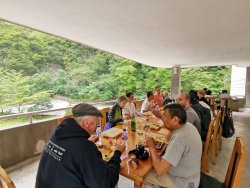
This was taken at the waterfall, where I found a bottle of, don't know #2 beer, or Tsing Tao beer from China.

This is our UK tour guide, and one of the local tour guides : Miss Pak. (Miss Pak's 2020 resolution is to find a boy and get married, apparently. You can watch the awkward conversation between these 2 on YouTube from 2:52)
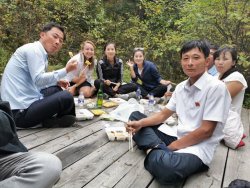
Here are all the people taking us around, 3 Korean tour guides for the whole tour, 1 tour guide from Pyongyang for most parts of the tour, plus camera + driver. Plus our guide from the UK.
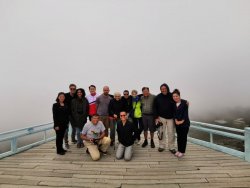
The first girl on the left is a local guide for that particular local attraction.
In DPRK, the tour guides you are with for your whole tour are there to help you during the tour, and as local 'fixers' (if you are familiar with any socialist / communist countries, you maybe familiar with terms like "not ready yet" "under renovation".
Then between each city, you may get a local guide from that city, and they would take over the work, while the tour guides for your whole trip would tag along so to speak.
Once you have arrived at a tourist spot (like this one), your tour guides would find the local guide for that tourist spot (and in this case, the girl on the very left). That tour guide will deal with everything. You say goodbye to that local tour guide when you leave the tourist attraction.

This was taken at the waterfall, where I found a bottle of, don't know #2 beer, or Tsing Tao beer from China.

This is our UK tour guide, and one of the local tour guides : Miss Pak. (Miss Pak's 2020 resolution is to find a boy and get married, apparently. You can watch the awkward conversation between these 2 on YouTube from 2:52)

Here are all the people taking us around, 3 Korean tour guides for the whole tour, 1 tour guide from Pyongyang for most parts of the tour, plus camera + driver. Plus our guide from the UK.

The first girl on the left is a local guide for that particular local attraction.
In DPRK, the tour guides you are with for your whole tour are there to help you during the tour, and as local 'fixers' (if you are familiar with any socialist / communist countries, you maybe familiar with terms like "not ready yet" "under renovation".
Then between each city, you may get a local guide from that city, and they would take over the work, while the tour guides for your whole trip would tag along so to speak.
Once you have arrived at a tourist spot (like this one), your tour guides would find the local guide for that tourist spot (and in this case, the girl on the very left). That tour guide will deal with everything. You say goodbye to that local tour guide when you leave the tourist attraction.
The following photos are also from our UK tour guide.
I don't know if it's appropriate to post the first photo, you know privacy; but, what the hell!
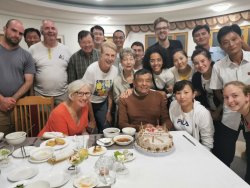
Birthday boy celebrated his birthday in the DPRK, at a beach resort! And he is, oh well, to hell with it. He turned 79! And he was always the first to reach the top when we go mountain hiking! He definitely nothing like a 79 years old.
We went down to the beach straight after cake. Birthday boy was there too.
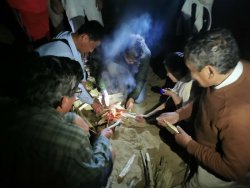
And our tour guides.

Many people think that going to the DPRK would be rigid, being watched, spied upon, tight, uncomfortable, always on high alert. You can see that it is nothing like that.
I don't know if it's appropriate to post the first photo, you know privacy; but, what the hell!

Birthday boy celebrated his birthday in the DPRK, at a beach resort! And he is, oh well, to hell with it. He turned 79! And he was always the first to reach the top when we go mountain hiking! He definitely nothing like a 79 years old.
We went down to the beach straight after cake. Birthday boy was there too.

And our tour guides.

Many people think that going to the DPRK would be rigid, being watched, spied upon, tight, uncomfortable, always on high alert. You can see that it is nothing like that.
Really interesting report. What nationalities were on the tour, How many were on it
Australia X 5
Netherlands X 2
NZ X 1
Peru X 1
Belgium X 1
Hong Kong X 1
Canada X 1
We Aussies are soooooo nailing it again.
What were most people's reasons for going?
Very good question.
Most are seasoned travellers, where we really want to go somewhere different, to see what it is about, so the DPRK has always been on everyone's mind. It has also been mentioned that the meeting with Donald Trump really accelerated that 'want', because we want to see the country before it is opened up too much.
Birthday boy from Peru told me, the first time he went to China was during the cultural revolution. (I wasn't even born then)
Canadian told me, the first time he went to China was 2 years before Tiananmen Square (1987)
One Aussie was a former journalist.
Another one Aussie now works in foreign affairs field.
Both Belgium and myself were going into the DPRK for the second time. Turned out our first time were both in 2018, about 1 month apart.
The person from Hong Kong is actually a tour guide who takes Hong Kong people into the DPRK. He told me that he does the run the mill tours, so he is coming in this time as a tourist, in order to see places outside of run of the mill like Pyongyang and DMZ. He had taken 5 tour groups from Hong Kong into DPRK, and this would be his 7th times going into the DPRK. He works in finance full time in Hong Kong. He started being a tour guide into the DPRK because he developed an interest in Korea (both north and south), especially in history geopolitics stuffs. He though, instead of wasting his money from his full time job on going into the DPRK, why not be a tour guide so he would get paid to go in?
He speaks very good South Korean, so he gets picked on in the DPRK
There are 2 more points of interest I could make here. 2 of our Korean tour guides were quite young (as you could see from the photos, with one looking for a boyfriend). Those 2 were checking him out at the beginning, but it didn't last long, because he could speak Korean and was chatting local girls up everywhere and anywhere. I think by day 3, we would get off the bus, go somewhere, he would run off to chat with whatever local girl he could get his hands on, the 2 young girl tour guides would make sure he hasn't gotten himself into trouble, see him chatting up local girls, they would
Point 1, is he was able to get a lot more information from the locals he talked with, which may tell him different stories to what the tour guides had to say to us;
Point 2, is the fact that, as long as you have proven yourself to be trustworthy, the tour guides don't 'watch' you, like some people think, being watched by a hawk. It just does not happen, we were allowed to wonder around many places, shops, as long as we stayed within the area.
I find it fascinating
The tour guide from Hong Kong described it this way: You learn something new, you discover new things, about the DPRK every time you go in, so you want to go back in for more, and again, and again.
but just don't think I'm game enough to do it.
I personally would not recommend living in there, or staying for too long. You can actually easily become too comfortable, which is what some people call 'security risks'. However, going in, and following the rules when you are told, is all that is needed. In fact, because there are people telling you what is OK what is not OK, the rules are clear, and the expectation is set early, I found it easier to go to the DPRK.
China scares me 100 times more, because you don't know what you are dealing with, you don't know what is OK what is not OK.
Then there are many African countries I would like to go to, but their security situations are much worse (like you really should learn French if you go to some of the places).
Well, we could not find anyone to show us around the village, and maybe let us into one of the residential houses (like last time), around the farms, so we just spent like 30 minutes looking at this:
(Yes, there is a theme going here, as we have left Pyongyang, which is used to having foreigners around)


We managed to find someone who could open up the machinery warehouse.
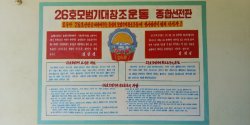
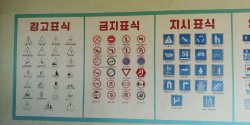
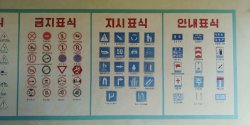



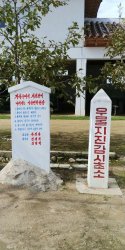


(Yes, there is a theme going here, as we have left Pyongyang, which is used to having foreigners around)

We managed to find someone who could open up the machinery warehouse.









Are we there yet?
No. It's a road trip. That's why it's a road trip. Look outside and see what you can spot.
This photo below was taken as we entered into Kumya 금야 . Notice the propaganda messages and the set up of the entry to the town.

The next 2 photos were taken as we were entering the town of Kowon 고원. Same set up as the town above.

Here is an intercity bus. This one is a very new bus from Yutong in China. Yes, all cars here are from China.
They do have interstate buses on many highways. However, having a route sign is a rarity, and most buses are much older. There also don't seem to be bus stop signs, but people 'just know' where to wait for these buses (where you see a large amount of people congregating at the side of a highway with luggage). Some of them can get very overcrowded.

Below were taken as we entered Munchon 문천 . Much smaller town as you could tell.


No. It's a road trip. That's why it's a road trip. Look outside and see what you can spot.
This photo below was taken as we entered into Kumya 금야 . Notice the propaganda messages and the set up of the entry to the town.

The next 2 photos were taken as we were entering the town of Kowon 고원. Same set up as the town above.

Here is an intercity bus. This one is a very new bus from Yutong in China. Yes, all cars here are from China.
They do have interstate buses on many highways. However, having a route sign is a rarity, and most buses are much older. There also don't seem to be bus stop signs, but people 'just know' where to wait for these buses (where you see a large amount of people congregating at the side of a highway with luggage). Some of them can get very overcrowded.

Below were taken as we entered Munchon 문천 . Much smaller town as you could tell.


Being next to the ocean and such good weather, our guides asked if we would like to take the bus or walk. No prize for guessing correctly.

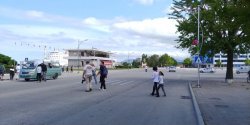

I took these 3 photos consecutively. I wanted to take a clear photo of this location, the major intersection of Wonsan, and also being the main square of Wonsan. Instead, I took 3 photos which are telling a different story.
Our tour guides were actually at the front. You could see the way we walked. We were walking among the local, and all split up. I stood back to take the last photo, until everyone had already walked off. I could have walked off into some shop in this instance, and nobody would notice.
You will be watched like children on the first few days when you arrive into DPRK, but if you follow the rules, prove yourself to be trustworthy, then this is how much freedom you have.



I took these 3 photos consecutively. I wanted to take a clear photo of this location, the major intersection of Wonsan, and also being the main square of Wonsan. Instead, I took 3 photos which are telling a different story.
Our tour guides were actually at the front. You could see the way we walked. We were walking among the local, and all split up. I stood back to take the last photo, until everyone had already walked off. I could have walked off into some shop in this instance, and nobody would notice.
You will be watched like children on the first few days when you arrive into DPRK, but if you follow the rules, prove yourself to be trustworthy, then this is how much freedom you have.
After crossing the road, we are now on the sea side.
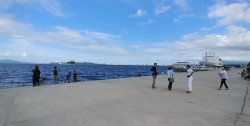
Oh, big ship. We will get on that later.
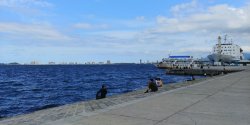
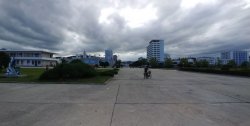
This is looking, from the sea side, back towards the intersection / square of Wonsan.
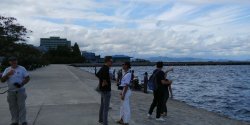
Let's start walking to the beach. Let's see if any of you could spot us tourists in the 3 pics below. You could see that we were not even walking as a tour group, we were just walking individuals randomly.
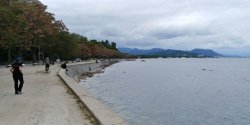
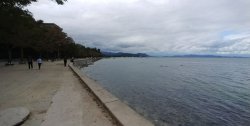
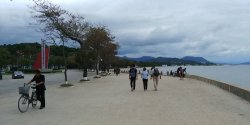
These 2 having a chat with one of our Korean tour guides. The rest of the group? No idea!

Oh, big ship. We will get on that later.


This is looking, from the sea side, back towards the intersection / square of Wonsan.

Let's start walking to the beach. Let's see if any of you could spot us tourists in the 3 pics below. You could see that we were not even walking as a tour group, we were just walking individuals randomly.



These 2 having a chat with one of our Korean tour guides. The rest of the group? No idea!
VPS
Enthusiast
- Joined
- Apr 2, 2011
- Posts
- 10,418
- Qantas
- LT Gold
- Virgin
- Gold
Australia X 5
Netherlands X 2
NZ X 1
Peru X 1
Belgium X 1
Hong Kong X 1
Canada X 1
We Aussies are soooooo nailing it again.
Very good question.
Most are seasoned travellers, where we really want to go somewhere different, to see what it is about, so the DPRK has always been on everyone's mind. It has also been mentioned that the meeting with Donald Trump really accelerated that 'want', because we want to see the country before it is opened up too much.
Birthday boy from Peru told me, the first time he went to China was during the cultural revolution. (I wasn't even born then)
Canadian told me, the first time he went to China was 2 years before Tiananmen Square (1987)
One Aussie was a former journalist.
Another one Aussie now works in foreign affairs field.
Both Belgium and myself were going into the DPRK for the second time. Turned out our first time were both in 2018, about 1 month apart.
The person from Hong Kong is actually a tour guide who takes Hong Kong people into the DPRK. He told me that he does the run the mill tours, so he is coming in this time as a tourist, in order to see places outside of run of the mill like Pyongyang and DMZ. He had taken 5 tour groups from Hong Kong into DPRK, and this would be his 7th times going into the DPRK. He works in finance full time in Hong Kong. He started being a tour guide into the DPRK because he developed an interest in Korea (both north and south), especially in history geopolitics stuffs. He though, instead of wasting his money from his full time job on going into the DPRK, why not be a tour guide so he would get paid to go in?
He speaks very good South Korean, so he gets picked on in the DPRK. This is actually to his advantage, because he could have a lot more, deeper conversations with other tour guides and locals, build rapport much quicker. When we had 2 nights of home stay, he was able to communicate with his host family, he told me that the family was really excited, put on karaoke for him, drank with him, talked until very late into the night.
There are 2 more points of interest I could make here. 2 of our Korean tour guides were quite young (as you could see from the photos, with one looking for a boyfriend). Those 2 were checking him out at the beginning, but it didn't last long, because he could speak Korean and was chatting local girls up everywhere and anywhere. I think by day 3, we would get off the bus, go somewhere, he would run off to chat with whatever local girl he could get his hands on, the 2 young girl tour guides would make sure he hasn't gotten himself into trouble, see him chatting up local girls, they wouldand
then leave him alone and walk off.
Point 1, is he was able to get a lot more information from the locals he talked with, which may tell him different stories to what the tour guides had to say to us;
Point 2, is the fact that, as long as you have proven yourself to be trustworthy, the tour guides don't 'watch' you, like some people think, being watched by a hawk. It just does not happen, we were allowed to wonder around many places, shops, as long as we stayed within the area.
The tour guide from Hong Kong described it this way: You learn something new, you discover new things, about the DPRK every time you go in, so you want to go back in for more, and again, and again.
I personally would not recommend living in there, or staying for too long. You can actually easily become too comfortable, which is what some people call 'security risks'. However, going in, and following the rules when you are told, is all that is needed. In fact, because there are people telling you what is OK what is not OK, the rules are clear, and the expectation is set early, I found it easier to go to the DPRK.
China scares me 100 times more, because you don't know what you are dealing with, you don't know what is OK what is not OK.
Then there are many African countries I would like to go to, but their security situations are much worse (like you really should learn French if you go to some of the places).
Thanks for all the info
craven morehead
Established Member
- Joined
- Aug 1, 2008
- Posts
- 2,728
- Qantas
- Platinum
- Virgin
- Gold
Just catching up on this very interesting TR 
Let's go to the beach.
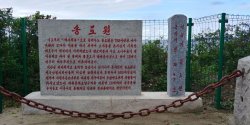
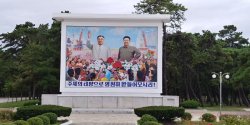

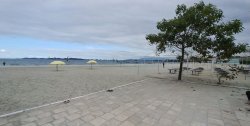
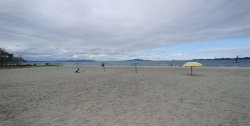
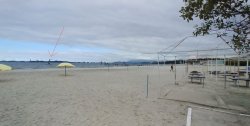
Not widely installed in Australia, many countries have floating decks out in the water, so you could swim out, climb onto the deck to have a rest, then swim back. Here in DPRK, they have concrete decks instead of floating (where I drew a red arrow), so you could climb onto them. Then, you could climb to the top, and perform an Olympic high dive.
Only 1 of the tour guides actually followed us to the beach. Well, turned out, from the photos below, from our UK tour guide's phone, the other tour guides ditched us, and were back at the main water front .......
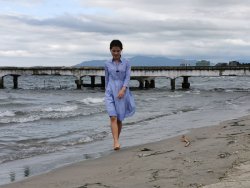
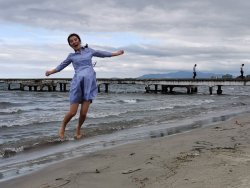
Filming an ad for Toyota DPRK market?
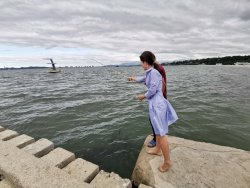
Ditched us, to go fishing with stranger? She's only 28?
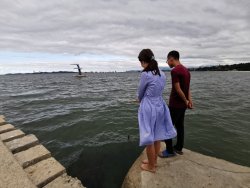
OK, she's just trying to pick up another boy (I think she's looking for a plan B, but I will leave it at that
(I think she's looking for a plan B, but I will leave it at that  )
)
Speaking of the tour guides ditching us. Not many people in DPRK could leave their own city, let alone going around the country. These tour guides being able to travel around the country, see all these things, are very lucky, let alone being paid to do it, and able to stay in good quality accommodations with us. Specially the 2 younger girls in their late 20s, they were also taking a lot of selfies during our trip. It was like they were on holiday some of the time instead of being tour guides.






Not widely installed in Australia, many countries have floating decks out in the water, so you could swim out, climb onto the deck to have a rest, then swim back. Here in DPRK, they have concrete decks instead of floating (where I drew a red arrow), so you could climb onto them. Then, you could climb to the top, and perform an Olympic high dive.
Only 1 of the tour guides actually followed us to the beach. Well, turned out, from the photos below, from our UK tour guide's phone, the other tour guides ditched us, and were back at the main water front .......


Filming an ad for Toyota DPRK market?

Ditched us, to go fishing with stranger? She's only 28?

OK, she's just trying to pick up another boy
Speaking of the tour guides ditching us. Not many people in DPRK could leave their own city, let alone going around the country. These tour guides being able to travel around the country, see all these things, are very lucky, let alone being paid to do it, and able to stay in good quality accommodations with us. Specially the 2 younger girls in their late 20s, they were also taking a lot of selfies during our trip. It was like they were on holiday some of the time instead of being tour guides.
Read our AFF credit card guides and start earning more points now.
AFF Supporters can remove this and all advertisements
- Status
- Not open for further replies.
Become an AFF member!
Join Australian Frequent Flyer (AFF) for free and unlock insider tips, exclusive deals, and global meetups with 65,000+ frequent flyers.AFF members can also access our Frequent Flyer Training courses, and upgrade to Fast-track your way to expert traveller status and unlock even more exclusive discounts!

AFF forum abbreviations
Wondering about Y, J or any of the other abbreviations used on our forum?Check out our guide to common AFF acronyms & abbreviations.
Currently Active Users
Total: 2,383 (members: 11, guests: 2,372)












